Select Language

Investing.com - The UK economy returned to growth in November, after the contraction seen in the prior month, but economic activity in the fourth quarter remains subdued, piling the pressure on the Bank of England to ease monetary policy further in 2025.
Data released earlier Friday by the Office for National Statistics showed that the UK economy grew by 0.1% in November, below the 0.2% expected, after contracting by 0.1% in October. This resulted in an annual growth rate of 1.0%, a drop from the revised lower 1.1% the prior month..
This sombre start to the fourth quarter marks a significant slowdown in growth momentum and output activity compared to the robust performance in the first half of the year.
Additionally, consumer and business confidence across major industries has declined significantly, compounding the existing headwinds, while the forthcoming increase in employers’ National Insurance Contributions, announced in the Autumn Budget, is expected to weigh on the labor market and dampen growth.
Throw in the potential for new tariff policies from the upcoming Trump administration and the possibility of a cut to government spending as the new Labour government contends with rising bond yields and significant downside risks to growth exist.
The International Monetary Fund forecasts that the UK will grow by 1.1% in 2024, which is slower than previous periods but would put the UK in the middle of the pack of the world's leading nations.
The BoE has reduced its benchmark Bank Rate twice since August - less than other central banks - and it has stressed it is likely to move gradually on further interest rate cuts, given persistent inflation pressures in Britain's economy.
It next meets in early February, and the pressure is mounting on the central bank to cut interest rates again, having last moved in November, reducing its base rate then to 4.75% from 5%.
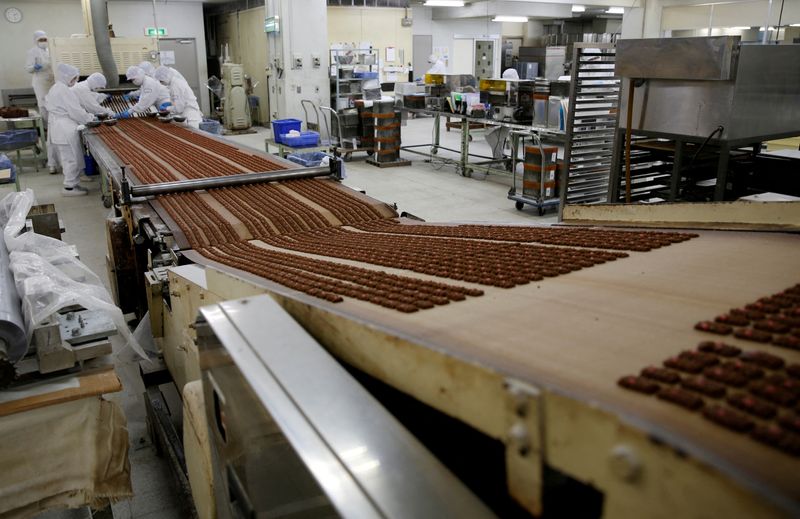
TOKYO (Reuters) - Two-thirds of Japanese companies are experiencing a serious business impact from a shortage of workers, a Reuters survey showed on Thursday, as the country's population continues to shrink and age rapidly.
Labour shortages in Japan, particularly among non-manufacturers and small firms, are reaching historic levels, the government has said, stoking concerns that this supply-side constraint could stifle economic growth.
Some 66% of respondents indicated that labour shortfalls were seriously or fairly seriously affecting their businesses, while 32% said the impact was not very serious.
"It goes without saying this drives up personnel costs, but it could even pose a business continuity risk," a manager at a railroad operator wrote in the survey.
The number of bankruptcies caused by labour shortages in 2024 surged 32% from a year earlier to a record 342 cases, according to credit research firm Teikoku Databank.
Nearly a third of respondents to the Reuters survey said the labour shortage is worsening, with only 4% reporting improvements and 56% saying the situation is neither getting better nor worse.
The survey was conducted by Nikkei Research for Reuters from Dec. 24 to Jan. 10. Nikkei Research reached out to 505 companies and 235 responded on condition of anonymity.
When asked about specific measures to address the labour shortfall in a question that allowed multiple answers, 69% said they were intensifying recruitment activities for new graduates and 59% were implementing such measures as extending retirement ages and re-hiring retired employees.
The official retirement age is set at 60 for about two-thirds of Japanese companies, although most have introduced measures allowing employees to keep working until they turn 65, a poll by the Health Ministry showed last year.
In response to a Reuters survey question about investment priorities for 2025, 69% chose capital investment and 63% selected wage hikes and other human resources-related investments. This question also allowed multiple answers.
"What's essential are wage hikes for retaining employees and capital investment for rationalising production," an official at a chemicals company said.
This trend in investment priority among Japanese firms aligns with the government's policy of seeking economic growth through higher wages and investments.
With labour shortages driving up wages and a weak yen raising import costs, 44% of Japanese companies plan to raise prices for their goods and services this year, the survey found. That compares with 17% that intend to keep their prices unchanged and 26% that plan to raise some prices but cut others.
"We just cannot help but raise prices because of an across-the-board increase in wages and other fixed costs, in transportation costs and in costs of raw materials," a manager at a metals company said in the survey.
Tokyo's core consumer price index, which excludes volatile fresh food costs, rose 2.4% in December from a year earlier. That was an acceleration from a 2.2% rise in November, keeping alive market expectations for a near-term interest rate hike.
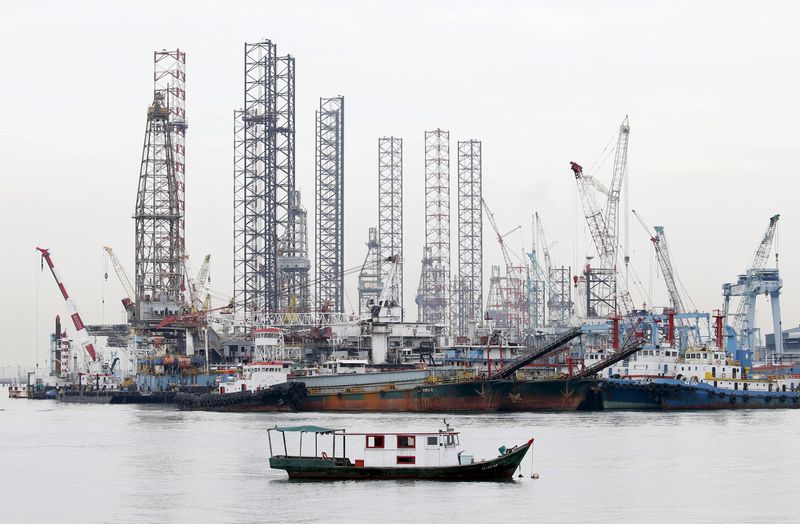
By Jeslyn Lerh
SINGAPORE (Reuters) - Marine fuel sales reached fresh highs at the world's largest bunker hub of Singapore in 2024, official data showed on Wednesday, driven by record container throughput and higher deliveries of alternative marine fuels.
Sales totalled 54.92 million metric tons in 2023, data from the Maritime and Port Authority of Singapore (MPA) showed. Total (EPA:TTEF) sales surpassed a previous record of 51.82 million tons in 2023.
Container throughput climbed to 41.12 million twenty-foot equivalent units (TEUs) in 2024, also logging new highs. Meanwhile, annual vessel arrival tonnage grew to a fresh record of 3.11 billion gross tons (GT).
More bunker volumes emerged in 2024 as shipping tensions in the Red Sea altered refuelling patterns and buoyed marine fuel demand, while shipowners also lifted more alternative fuels to support emission cuts, said industry sources.
The year also saw significantly stronger sales in high-sulphur marine fuel, with volumes totalling 20.15 million tons, up 21% from 2023, calculations based on MPA data showed.
The uptick in high-sulphur marine fuel sales came amid a higher fleet of vessels fitted with scrubbers.
In contrast, sales of low-sulphur fuel dropped 4% year-on-year to 29.58 million tons.
Meanwhile, sales of alternative bunker fuels exceeded one million tons for the first time, reaching 1.34 million tons in 2024, doubling from 2023, said MPA.
Sales of biofuel blends grew to about 880,000 tons, up about 69% from 2023, while sales of liquefied natural gas for bunkering rose to over 460,000 tons, more than quadrupling.
BP (NYSE:BP) SINGAPORE PTE. LIMITED
CHEVRON SINGAPORE PTE LTD
ENG HUA COMPANY (PTE) LTD
EQUATORIAL MARINE FUEL MANAGEMENT SERVICES PTE LTD
GLENCORE SINGAPORE PTE LTD
GLOBAL ENERGY TRADING PTE LTD
PETROCHINA INTERNATIONAL (S) PTE LTD
SINOPEC FUEL OIL (SINGAPORE) PTE. LTD.
TFG MARINE PTE LTD
VITOL BUNKERS (S) PTE LTD
CHEVRON SINGAPORE PTE LTD
MAERSK OIL TRADING SINGAPORE PTE LTD
MINERVA BUNKERING PTE LTD
SK ENERGY INTERNATIONAL PTE LTD
VITOL BUNKERS (S) PTE. LTD.
(Data Source: MPA Singapore)
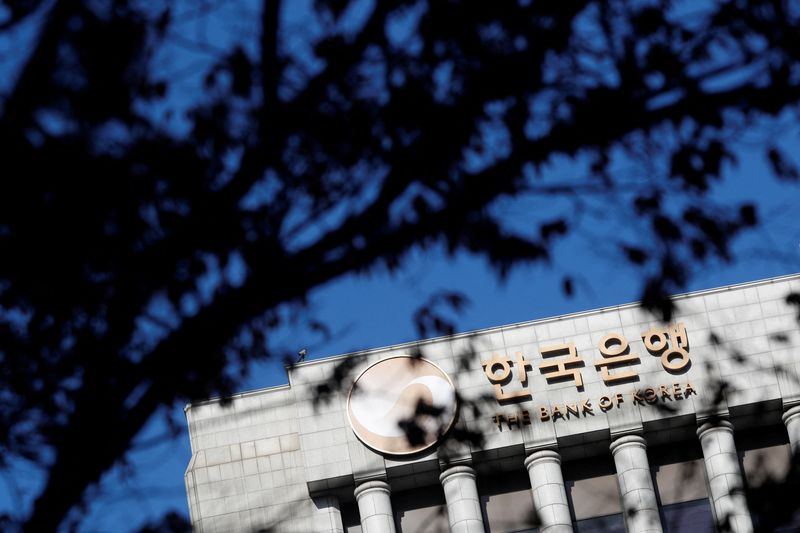
By Cynthia Kim and Jihoon Lee
SEOUL (Reuters) - South Korea's central bank unexpectedly left its policy interest rate unchanged on Thursday, weighing the impact of its back-to-back cuts last year while supporting the won which weakened to a 15-year low versus the U.S. dollar in recent weeks.
The Bank of Korea held its benchmark interest rate at 3.00% at its monetary policy review, an outcome expected by only seven of 34 economists polled by Reuters. The remaining 27 had expected the bank to cut the rate by 25 basis points.
The decision is the first since impeached President Yoon Suk Yeol's attempt to impose martial law in early December threw Asia's fourth-largest economy into its biggest political crisis in decades. The turmoil prompted the government to cut its 2025 economic growth forecast to 1.8% from 2.2%.
The crash of Jeju Air flight 7C2216, which killed 179 people in the deadliest air disaster on South Korean soil, has also weighed on the economy.
On top of that, the won's slide has been a major concern among policymakers. In the final three months of 2024, the currency weakened 10.6% against the dollar, the biggest quarterly drop since the third quarter of 2008.
Local currency dealers said South Korea has been relying on smoothing operations in the onshore dollar-won market as well as the National Pension Service's currency hedging operations to support the won.
"(Thursday's rate decision) would be due to its (the BOK's) greater focus on economic and financial stability concerns, until political uncertainty eases. Instead of January, we expect the BOK to cut the policy rate again at its February meeting, after it revises its economic outlook." said Park Jeong-Woo, an analyst at Nomura Securities who was one of the seven analysts who correctly predicted the rate decision.
Analysts now see the central bank eying a more gradual pace of interest rate reduction in the year ahead.
Median forecasts in the survey showed one interest rate cut of 25 basis points this quarter and cuts of the same degree in both the second and third quarters taking the rate to 2.25%.
Market focus now switches to Governor Rhee Chang-yong's press conference at 0210 GMT, where the names of any dissenters to the policy decision could be announced. Dissenting votes typically lead to policy changes in subsequent months.
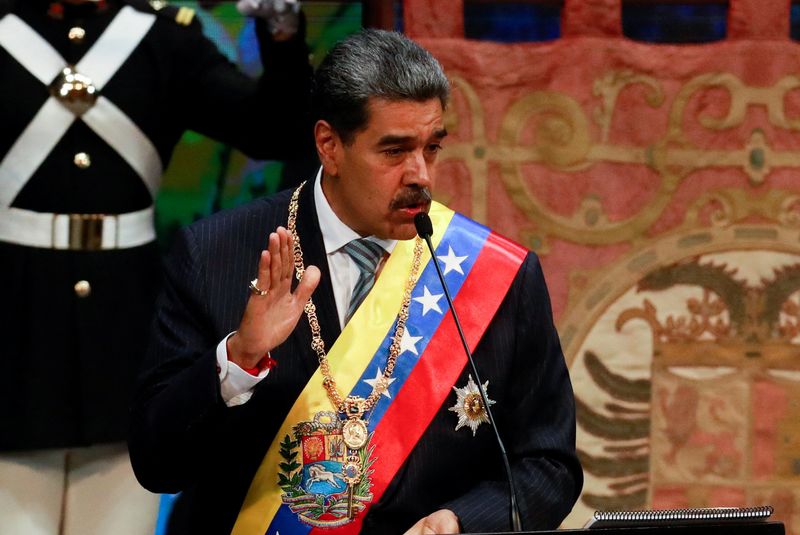
CARACAS (Reuters) - Venezuela inflation was 48% annually in 2024, the lowest in 12 years, Venezuelan President Nicolas Maduro told lawmakers in an annual address to the national assembly and other officials on Wednesday, just days after he was inaugurated for a third term.
Maduro, whose nearly 12 years in office have been marked by deep economic and social crisis and mass migration, was sworn in for a third term on Friday, despite a six-month-long election dispute and international calls for him to stand aside.
The government has employed orthodox methods to try to tamp down inflation, which has reached triple digits in recent years, with some success. Inflation was 189.8% in 2023, according to the central bank. Maduro said this month that the economy grew 9% last year.
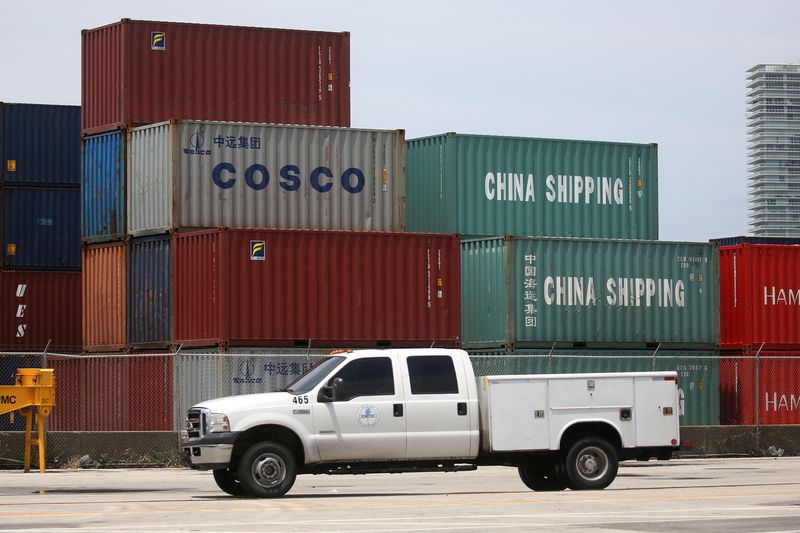
By Lisa Baertlein and Ellen Zhang
LOS ANGELES/BEIJING (Reuters) - U.S. imports from China finished the year strong after some companies stockpiled shipments of apparel, toys, furniture and electronics ahead of President-elect Donald Trump's plan to impose new tariffs that could revive a trade war between the world's economic superpowers.
Trump, who has threatened to slap tariffs of 10% to 60% on goods from China, takes office on Jan. 20. During his first term, Trump mainly targeted Chinese parts and components. Economists and trade experts predict his next wave of tariffs could apply to finished goods.
"There has thus been an uptick in the exports of final goods from China to the U.S., as importers aim to front-run possible tariffs on consumer items," said Frederic Neumann, chief Asia economist at HSBC in Hong Kong.
Chinese trade officials on Monday said December exports surged to record levels and cited concerns about escalating trade protectionism in the U.S. and Europe.
The equivalent of 451,000 40-foot containers of goods from China landed at U.S. seaports in December, a year-over-year increase of 14.5%, according to trade data supplier Descartes Systems Group (NASDAQ:DSGX).
That capped a year when U.S. imports of bedding, plastic toys, machinery and other products from China rose 15% from 2023, according to Descartes.
While some U.S. retailers have rushed in goods to avoid the cost hit from potential new tariffs, teasing out the true effect on overall import gains is difficult because importers keep such data private. Further complicating the analysis, resilient U.S. shoppers have been fueling demand and some importers brought in safety stocks to protect against disruptions from Houthi attacks on shipping near the Suez Canal trade shortcut and a labor dispute at seaports on the U.S. East Coast and Gulf of Mexico.
Trump also has vowed to tariff goods from many other countries, including North American neighbors Mexico and Canada.
As a result, several categories of U.S. imports from all geographic sources posted meaningful gains during the fourth quarter, according to S&P Global Market Intelligence.
Textiles and apparel jumped 20.7%; leisure products, chiefly toys, gained 15.4%; home furnishings increased 13.4%; and household appliances and consumer electronics posted gains of 9.6% and 7.9%, respectively, according to S&P.
Consumer staples categories such as household and personal care as well as food and beverages, rose 14.2% and 12.5%, S&P said.
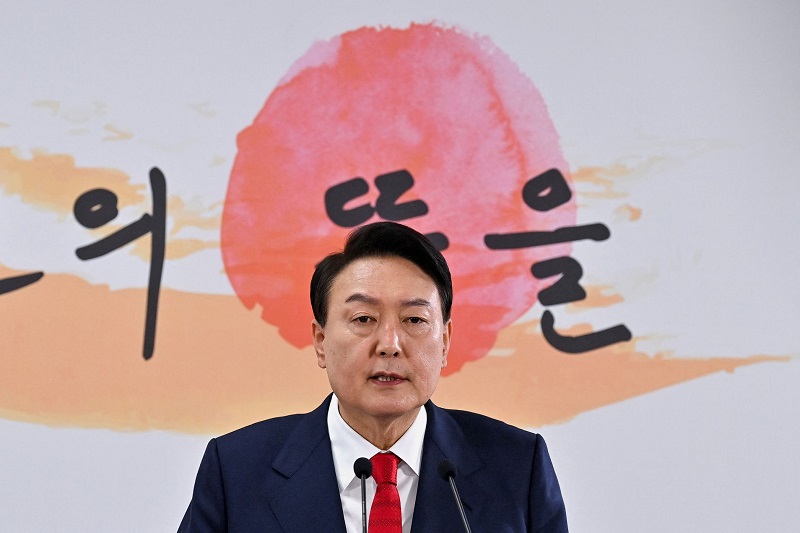
Investing.com-- Impeached South Korean President Yoon Suk Yeol was arrested by authorities on Wednesday following a botched attempt to impose military law in the country in late-2024, local media reports showed.
Reports said that investigators had entered Yoon’s Presidential compound in their second attempt this month to carry out an arrest warrant, and had successfully apprehended the impeached president.
Yoon will now be tried on charges of insurrection, after unsuccessfully attempting to impose martial law in December. The move was widely opposed by citizens and policymakers, sparking nationwide protests and calls for Yoon’s removal.
Deputy Prime Minister Choi Sang-mok assumed the role of acting President after South Korea’s parliament voted to impeach Yoon.
South Korean markets- which were rattled by the political scandal in December- firmed on the prospect of some stability after Yoon’s arrest. The benchmark KOSPI index added 0.5% on Wednesday, while the won’s USD/KRW pair was flat.
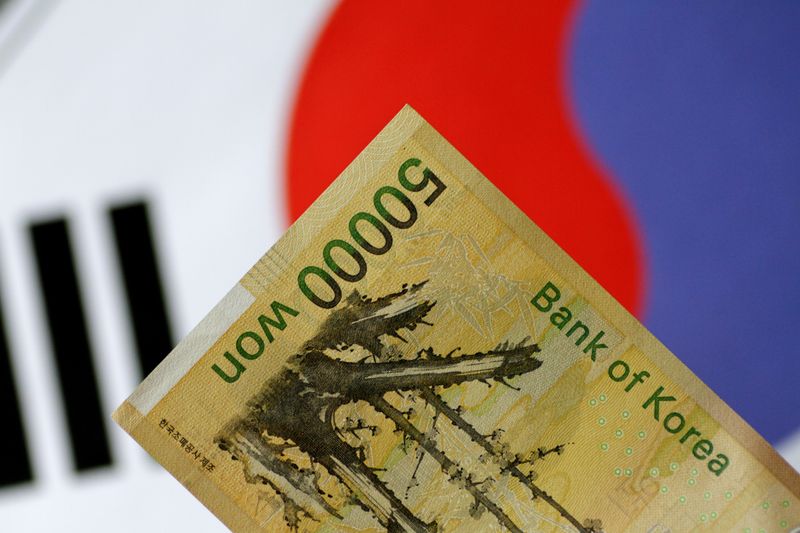
SEOUL (Reuters) - South Korea's capital markets in December experienced the largest foreign outflows since March 2020 as heightened political uncertainty hit investor sentiment, central bank data showed on Wednesday.
Foreigners last month extended their South Korean stock market selloff to a fourth straight month by selling a net $2.58 billion.
In the bond market, they turned net sellers for the first time in nine months, with a net outflow of $1.28 billion.
The monthly outflow of a combined $3.86 billion was the biggest since March 2020, when global financial markets were hit by the COVID-19 pandemic, according to the Bank of Korea.
Last month, the won weakened 5.2% against the dollar, marking its largest monthly decline in 22 months on heightened political uncertainty after President Yoon Suk Yeol's short-lived martial law on Dec. 3.
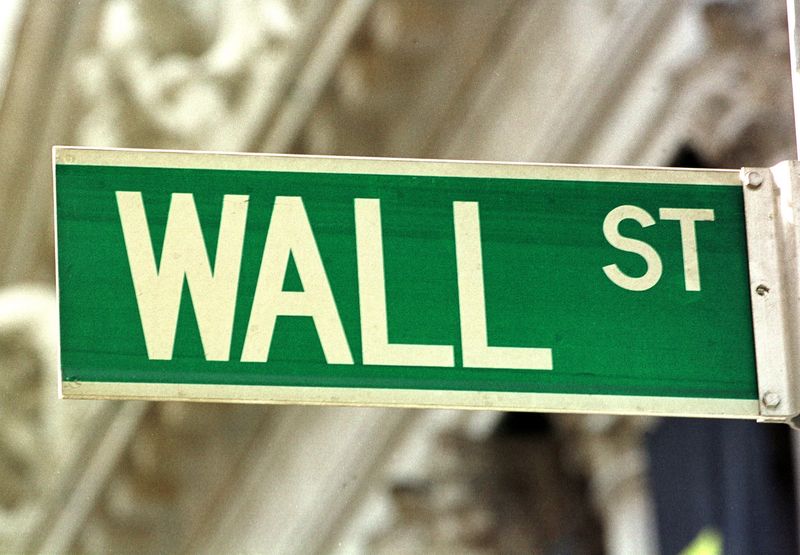
Investing.com-- U.S. stock index futures rose slightly on Tuesday evening as caution grew ahead of key consumer inflation data that is likely to factor into the Federal Reserve’s outlook on interest rates.
Futures were muted after a choppy session on Wall Street, as softer than expected producer inflation data provided only limited relief over a hawkish outlook for interest rates.
Investors were also cautious before a string of major bank earnings on Wednesday.
S&P 500 Futures rose 0.1% to 5,886.25 points, while Nasdaq 100 Futures rose 0.1% to 20,949.50 points by 18:38 ET (23:38 GMT). Dow Jones Futures rose 0.1% to 42,792.0 points.
Among individual movers, Tesla Inc (NASDAQ:TSLA) fell 0.4% after the Securities and Exchange Commission sued CEO Elon Musk for failing to disclose a substantial stake in Twitter during his purchase of the social media firm.
CPI data awaited for more rate cues
Focus was now squarely on upcoming consumer price index inflation data, which is expected to provide more insight into the Fed’s plans for interest rates.
The reading is due at 08:30 ET (13:30 GMT), and is widely expected to show inflation remained sticky in December.
Sticky inflation gives the Fed less impetus to cut interest rates, with the bank having warned as much during its December meeting.
Markets are positioning for a much slower pace of interest rate cuts in 2025- a trend that could bode poorly for risk-driven assets. Wall Street indexes had slumped through late-2024 on this notion.
PPI data offers limited relief
Producer price index inflation data released on Tuesday read softer than expected for December. But the print provided little relief to markets, given that some measures of inflation, which also factor into PCE price index data, remained high. PCE data is the Fed’s preferred inflation gauge, and is due later in the month.
On the inflation front, markets were also on edge over incoming President Donald Trump, who will take office from January 20. Fed officials recently expressed concerns that Trump’s plans for hefty trade tariffs will underpin inflation, keeping rates higher in the long term.
A Bloomberg report showed this week that Trump’s team was also considering a more staggered approach to tariffs.
Wall St nurses weak start to 2025; earnings awaited
Wall Street indexes marked a chippy session on Tuesday amid persistent weakness in technology stocks. They were also nursing a weak start to the year after tumbling from record highs through December.
The S&P 500 rose 0.1% to 5,842.86 points on Tuesday, while the NASDAQ Composite fell 0.2% to 19,044.39 points. The Dow Jones Industrial Average rose 0.5% to 42,518.28 points.
Focus this week is also on a string of key bank earnings. Prints from JPMorgan Chase & Co (NYSE:JPM), Wells Fargo & Company (NYSE:WFC), Goldman Sachs Group Inc (NYSE:GS), and Citigroup Inc (NYSE:C) are due on Wednesday.
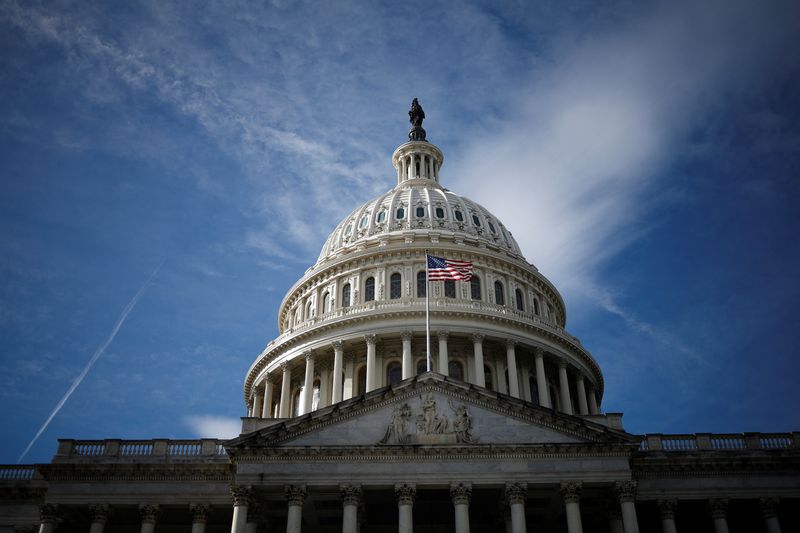
WASHINGTON (Reuters) - The U.S. government posted an $87 billion budget deficit in December, reduced partly by a shift of benefit payments into November but capping a record $711 billion deficit for the first three months of the 2025 fiscal year, the U.S. Treasury Department said on Tuesday.
The Treasury, releasing its final budget report before President-elect Donald Trump takes office next week, said that the $711 billion October-December deficit was $201 billion, or 39% higher, than the $510 billion deficit in the same period a year earlier as outlays grew sharply and revenues declined slightly.
For December, the $87 billion deficit was reduced by $51 billion by the calendar benefit shift, and compared to a $129 billion deficit in December 2023. Receipts for the month were up 6% to $454 billion, while outlays as reported were down 3% to $541 billion.

